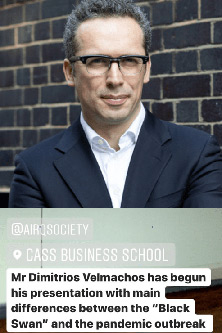The impact of Covid-19 on the insurance sector
The outbreak of the Covid-19 pandemic has had a huge and devastating impact across the world with its ramifications starting to be discerned across various sectors such as health, finance and aviation.
This has threatened the global supply chain which resulted in an economic stall.
The insurance industry has not been spared with new questions arising as the crisis unfolds. Stakeholders want to understand the business’ exposure to the virus as well as what the future holds for the insurance market.
As an MSc Actuarial Management student, joining a student society and hosting events that impact the professional sector I am training has added a lot of value to my studying experience. As Co-President of the Actuarial, Insurance, Risk and Quants Society (AIR-Q), it was an honour to work on the ‘Impact of COVID-19 on the insurance sector’ webinar. The session was AIR-Q Society’s take on investigating and tackling these issues. The event’s keynote speakers, Mr Michael Tripp, Mr Dimitrios Velmachos and Mr Asif John, gave their thoughts on the implications of the pandemic to the UK insurance market, risk management techniques and the future of data analytics in modelling insurance products. The speakers also addressed any questions posed by the attendees based on their vast knowledge and experience in insurance. The event was hosted and moderated by one of our society Co-presidents, David Flanigan.
Why Covid-19 is not a ‘black swan’
This question was initiated by Mr Velmachos, an entrepreneur and insurance executive by profession. He highlighted that the black swan notion was brought about by the theories discussed by Nassim Taleb in his book, ‘The Black Swan: The Impact of the Highly Improbable’.

The notion was based on the similarities between Covid-19 and author’s definition of a black swan.
According to the definition: First, nothing in the past can convincingly point to its possibility. Second, it carries an extreme ‘impact.’ Third, in spite of its outlier status, human nature makes us concoct explanations for its occurrence after the fact, making it explainable and predictable.
Dimitrios explained that the pandemic does not fully satisfy the properties of a black swan. In fact, many warned the pandemic would happen, including influential people like Bill Gates who clearly stated that the world was not ready for the next pandemic.
With such discussions setting the mood for the forum, the speakers then delved into the insurance world by giving presentations on how various classes of insurance have been impacted in the UK.
Impact on general insurance
Mr Tripp’s discussion focused on the impact of Covid-19 on general insurance segments. As a general insurance actuary working at Mazars UK, Michael stated that actions taken by the government to curb the spread of the virus has resulted in a myriad of general insurance claims. For instance, several corporations have been counting their losses following regulations by the government to close business providing non-essential services. As a result, there has been an increase in business interruption claims prompting insurers to review their policy wordings.

Michael further stated that travel insurance business has also experienced an influx of claims due to cancellation of flights after many states issued travel bans. This argument was also backed up by Mr Asif John, an actuary by profession and founder of ARGenesis consultancy, who emphasised that many travel insurance policies did not exclude coronavirus from cover. Hence, insurers are expected to settle any claim that may arise from these policies.
John highlighted that classes such as commercial liability lines and credit insurance are likely to encounter significant losses in the long haul. For example, a number of health workers have taken to legal action against the NHS claiming negligence by the government in ensuring that personal protective equipment was delivered on time, thereby endangering their lives.
Nonetheless, some general insurance lines have had better claim experience since the pandemic emerged in late 2019 as pointed out by both Michael and John. Classic examples include motor insurance and household contents whereby fewer claims have been reported due to the imposed lockdown. This move by the government resulted in many individuals normalising working from home, thereby leading to a significant reduction in the use of vehicles. With fewer cars on our roads, there have been fewer accidents occurring.
There has also been a reduction in theft leading to fewer burglary claims reported. However, Michael also brought out the fact that the lockdown has also resulted in companies relying on IT systems to deliver value to their clients. As such, there might be an increase in claims relating to cyber risk in the future, and insurers should thus tighten their policy wordings on this cover.
Impact on life and health insurance
The impact on both life and health insurance seems to go hand in hand due to the short timeframe between diagnosis and death. This has led to an increase in both the morbidity and mortality experiences as highlighted by John. The country’s health insurance sector is thus facing losses as a result of the high number of coronavirus cases. The dramatic reduction of health workers available to attend to other serious cases such as cancer will exacerbate future morbidity experience.
Besides the significant impact on mortality, Michael also pointed out that the shock experienced in the financial markets will also impact life insurance companies. This stems from the fact that they have long term liabilities and as such tend to hold long term assets. Extreme market volatility will negatively impact both the income and capital on these assets such as equity, thereby creating tremendous asset-liability management risks.
Data analysis as a tool for risk management
Being an AI and data science specialist, Asif stressed the importance of data analytics to the current situation, in particular, areas which actuaries should start focusing on. Adoption of data techniques through the use of advanced models will, therefore, succour in eliminating data issues at the input stage leading to credible forecasting.

Analysis of data at a granular level is also key for insurance companies as highlighted by Dimitrios. Granularity helps in properly understanding the data thus making aggregation of datasets into different segments easier. Better risk management techniques may also be identified as a result of having detailed data as risks will be classified and assessed homogenously.
Dimitrios also touched on the importance of incorporating epidemiological features in the modelling process in order to expand the dimensions of the output. This will help in analysing the worst-case scenario hence help in pricing and reserving and proper risk management.
What does the future hold for insurers?
Insurers need to seize some of the opportunities arising out of this crisis. It is clear that the traditional distribution channels have been disrupted indicating the need for accelerated digital transformation. Process optimisation is inevitable for insurers as working from home has become the new norm. The introduction of additional covers such as telemedicine will also be a boost to the insurance penetration in the future.
Thank you!

Being part of AIR-Q has been an incredible addition to my master’s experience: I have gained much deeper knowledge of the actuarial field, networked and built many new friendships. Myself and my fellow Co-Presidents of AIR-Q Society (Rocio Plasencia, Juan Sebastian De La Torre, Evangelos Santas, Adam Upenieks, David Flanigan and Peter Vodička) would like to thank the speakers, attendees and the Business School’s events team for making this webinar a success. Special thanks also go to Leon Cuthbertson from the events team for assisting with the event. We’d always like to hear your thoughts, so follow us on LinkedIn or Instagram!
Lucy Nondi, MSc Actuarial Management (2020)